Networks to Share Concerns
ASCD's member-initiated networks provide opportunities for sharing information related to a common interest area in education. ASCD members may join—or even create—a network to share a common interest with professional colleagues through such venues as e-mail, newsletters, or meetings at ASCD's annual conference.
Each network operates independently and provides different kinds of resources to its members. For example, 12 networks presented forums on special topics at ASCD's 2002 conference, and several networks issue electronic or print newsletters. Members of the African American Issues Network and the Hispanic Issues Network provided valuable input for the ASCD Diversity Team's report and planning for ASCD's diversity initiative. To find out more about networks concerned with issues of equity and opportunity, contact the following facilitators:
African American Critical Issues Network
- Donald Davis, Principal, McDuffie County Schools, Grovetown, Georgia; (706) 595-3820; fax: (706) 595-2008;<LINK URL="mailto:dadavis@ix.netcom.com">dadavis@ix.netcom.com</LINK>
Hispanic Critical Issues Network
- Eduardo R. Rivas, Administrative Director, Office of Educational Planning, Miami-Dade County Public Schools, Miami, Florida; (305) 995-2561; fax: (305) 995-1520;<LINK URL="mailto:erivas@sbab.dade.k12.fl.us">erivas@sbab.dade.k12.fl.us</LINK>
Lesbian, Gay, Bisexual, Transgendered, and Allied Issues in Education Network
- Michael W. Pietrzak, Director, Interactive Teaching and Learning Project, Northeastern Illinois University, Chicago, Illinois;<LINK URL="mailto:m_pietrzak@nciu.edu">m_pietrzak@nciu.edu</LINK>
Religion and Public Education Network
- James K. Uphoff, Professor Emeritus of Education and Associate Director, Wright State University Center for Teaching and Learning, Dayton, Ohio; (937) 299-5139; fax: (937) 299-0878;<LINK URL="mailto:jkuphoff@aol.com">jkuphoff@aol.com</LINK>
Women's Leadership Issues Network
- Donna Butler, Director of Educational Outreach, College of Education, University of Georgia, Athens, Georgia; (706) 542-4051; fax: (706) 542-0360;<LINK URL="mailto:dqbutler@coe.uga.edu">dqbutler@coe.uga.edu</LINK>
To find out more about ASCD's other networks, visitwww.ascd.org/aboutascd/cr/networks/aboutnet.html, or contact ASCD Network Liaison Rochelle Jones, rjones@ascd.org.
Call for Nominations
ASCD's Nominations Committee invites all members to nominate candidates for the 2003 General Membership election for President-Elect and a Review Council Member.
For candidacy forms, please contact Debra Hill, (847) 272-6880, fax: (847) 272-4818,dhill@dist31.k12.il.us; or Becky DeRigge, ASCD, (800) 933-2723 or (703) 575-5601,bderigge@ascd.org; or find the forms at www.ascd.org/aboutascd. Debra Hill must receive completed forms no later than Dec. 31, 2002.
Resources for Teaching Diverse Learners
Two books—Educating Everybody's Children: Diverse Teaching Strategies for Diverse Learners (Stock no. 195024; $21.95, members; $25.95, nonmembers) and More Strategies for Educating Everybody's Children (Stock no. 100229; $21.95, members; $25.95, nonmembers)—offer practical strategies for teaching in diverse classrooms. A six-tape video set with two facilitator's guides, Educating Everybody's Children (Stock no. 400228; $820, members; $1,040, nonmembers), can help educators implement these innovative strategies.
For how best to respect the rights of students from diverse religious backgrounds, see Finding Common Ground: A Guide to Religious Liberty in Public Schools (Stock no. 303106; $19.95, members and nonmembers), by Charles C. Haynes and Oliver Thomas and published by the First Amendment Center.
How can educators best understand the pedagogical needs of students who live in poverty? Instructional strategies that have proven effective with impoverished children will be the focus of one of ASCD's upcoming professional development institutes (Understanding Students Living in Poverty; January 22-23, 2003; Orlando, Florida; PD03GE017; $329, members; $379, nonmembers). Call the ASCD Service Center at (800) 933-2723 or register online (www.ascd.org/registration/registrationframe).
Activating the Civic Mission of Schooling
How can educators best teach democratic principles? How can schools provide students with meaningful opportunities to practice the skills necessary for citizenship? On Oct. 2, 2002, the Education Commission of the States and the National Council for the Social Studies joined ASCD in sponsoring a meeting of representatives from the civic education community, service learning organizations, and national education associations to discuss ways to renew the civic mission of schools.
Meeting at ASCD's headquarters, the group first met with a representative from the White House, Director of the USA Freedom Corps John Bridgeland, who described the Bush administration's national initiative on U.S. history, civics, and service and engaged in a dialogue with participants on such issues as the impact of the No Child Left Behind legislation on civic education initiatives, the role of the federal government in challenging states to foster civic education, and how students best learn the knowledge and skills of citizenship.
The group then discussed recommendations for policy, best practices, and effective professional development, concluding that citizenship must be taught across the curriculum and integrated into the curriculum at all grade levels, K-16. Civic education must strive both for students' academic proficiency in history and civics and students' engagement in the skills of citizenship through programs that meet real community needs. The group also agreed that schools model freedom and justice best when all members of the school community have a real voice in shaping the life of the school.
The group has sent recommendations to the White House and will be planning other activities to further the civic mission of schooling.
Your Turn
For our May 2003 issue on keeping good teachers in the classroom, we would like to hear from you.
Teachers: How have you overcome a specific obstacle that might have driven you out of teaching—but didn't? What particular action helped—or helps—you overcome this problem?
Administrators: Have you ever supervised a good teacher who seemed about to leave—but didn't? Please tell us what particular action changed the teacher's mind.
Please send us a brief (approximately 300-word) narrative by Feb. 15, 2003, in an e-mail (el@ascd.org), by fax (703) 575-5400, or by mail (Educational Leadership, ASCD, 1703 N. Beauregard St., Alexandria, VA 22311). Please reference “Your Turn” in the title and include your name, job title, school or school district, address, daytime phone number, and e-mail address. We will excerpt some of the narratives in our May issue. We look forward to hearing from you.

